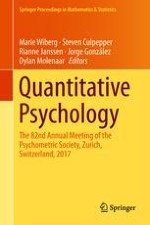2018 | OriginalPaper | Buchkapitel
Elimination Scoring Versus Correction for Guessing: A Simulation Study
verfasst von : Qian Wu, Tinne De Laet, Rianne Janssen
Erschienen in: Quantitative Psychology
Aktivieren Sie unsere intelligente Suche, um passende Fachinhalte oder Patente zu finden.
Wählen Sie Textabschnitte aus um mit Künstlicher Intelligenz passenden Patente zu finden. powered by
Markieren Sie Textabschnitte, um KI-gestützt weitere passende Inhalte zu finden. powered by
